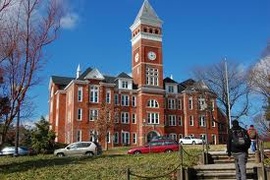By RICK BRUNDRETT
 The search committee for Clemson University’s next president kept the public from having easy access to its meetings, documents released Monday evening to The Nerve reveal.
The search committee for Clemson University’s next president kept the public from having easy access to its meetings, documents released Monday evening to The Nerve reveal.
Four of nine committee meetings were held in an office high-rise building across the street from the State House in downtown Columbia, according to meeting minutes provided by the university under the S.C. Freedom of Information Act.
The last meeting was held over two days at an Atlanta airport hotel – more than 130 miles from the Upstate research university’s main campus.
In addition, Clemson spokeswoman Cathy Sams said in an initial email Monday to The Nerve that “in order to have the highest quality applicant pool possible, based upon the advice of the search consultant, public interviews were not conducted.”
Two Clemson University alumni, one of whom is a Clemson administrator, were finalists for the president’s position, Sams said Monday, though an out-of-state candidate ultimately was selected for the job.
Besides West Virginia University President Jim Clements, whom the Clemson Board of Trustees tapped earlier this month to become Clemson’s 15th president, the other two finalists were, according to Sams:
- Brett Dalton, Clemson’s vice president for finance and operations. Dalton earn both his bachelor’s and master’s degrees from Clemson; and
- Dr. Spence Taylor, vice president of academics and the University Medical Group’s executive director for the University of South Carolina School of Medicine at the Greenville Health System. Taylor received his bachelor’s degree from Clemson and his medical degree from the Medical University of South Carolina.
As Clemson’s new president, Clements reportedly will receive an initial annual salary of $775,000, the same salary he currently receives at WVU. Outgoing Clemson President Jim Barker receives a salary of $471,213, split between state and university foundation funds, according to various media reports, though university spokesman Robin Denny earlier told The Nerve that Barker’s salary is $418,213.
Dalton’s salary at Clemson is $321,334, according to a state salary database maintained by the S.C. Budget and Control Board. Salary information for Taylor was not immediately available Monday evening.
The release Monday by Sams of the finalists’ names came 12 days after The Nerve submitted a request to Clemson under the Freedom of Information Act (FOIA) for a list of the finalists and related documents.
There were 83 applicants for the position, university officials revealed after Clements was selected on Nov. 11, though they didn’t release the names of the finalists before or immediately after Clements’ selection, as The Nerve reported on Nov. 15.
The S.C. Supreme Court in 2007 ruled that disclosure of employment-search records for public positions is required for the “final pool of applicants of at least three people,” even if there are less than three designated finalists. But under the FOIA, public agencies don’t have to release those records unless asked to do so.
Besides keeping the list of finalists secret until Monday evening, Clemson also held search committee meetings in out-of-the-way locations, meeting minutes released under the FOIA show.
The committee, made up of David Wilkins, Clemson’s board chairman; six other board trustees; and the faculty Senate president, held nine meetings from April 22 through Oct. 15 – six more than revealed earlier this month on Clemson’s website – though none of those meetings was held on Clemson’s main campus, according to meeting minutes. An open forum with Clemson faculty, staff and students was held in June, according to the website.
In the Nov. 15 Nerve story, Wilkins, the former S.C. House speaker and U.S. ambassador to Canada, said the committee met “four to six” times. Wilkins also said he was a non-voting member of the panel, though Sams in her initial email Monday evening to The Nerve said all committee members were “voting members.”
Meeting minutes show that four of the nine meetings were held at Clemson’s Office of Governmental Affairs on the 19th floor of an office high-rise building across the street from the State House in downtown Columbia; one of those meetings was by teleconference. The initial organizational meeting was held at the Greenville office of the Nelson Mullins law firm where Wilkins is a partner, located on the 17th floor of an office building.
The committee held its Oct. 11 meeting at the Greenville Marriott hotel near the Greenville-Spartanburg International Airport, according to the meeting minutes. The final meeting was held over two days on Oct. 14 and 15 at the Marriott Atlanta Airport Gateway near the Hartsfield-Jackson International Airport – about 134 miles from Clemson’s main campus – and started at 7:35 a.m. the first day, minutes show.
Details on the number of applicants or finalists were not revealed in any of the minutes provided to The Nerve. Typically, Smyth McKissick, the committee’s chairman, said during the meetings that it was “necessary to go into executive session” to discuss personnel or legal matters, according to the minutes.
Wilkins earlier told The Nerve that Clements was offered the job “less than a week” before the official announcement on Nov. 11.
The Nerve Monday night sent additional written questions to Sams, seeking an explanation, among other things, about why the search committee meetings were held off campus.
“I don’t have any further information about the search process beyond what was in my original email,” Sams replied. “Chairman Wilkins made a number of statements at the press conference about why Dr. Clements was selected, and I don’t have anything to add to his comments.”
Reach Brundrett at (803) 254-4411 or rick@thenerve.org. Follow him on Twitter @thenerve_rick. Follow The Nerve on Facebook and Twitter @thenervesc.
